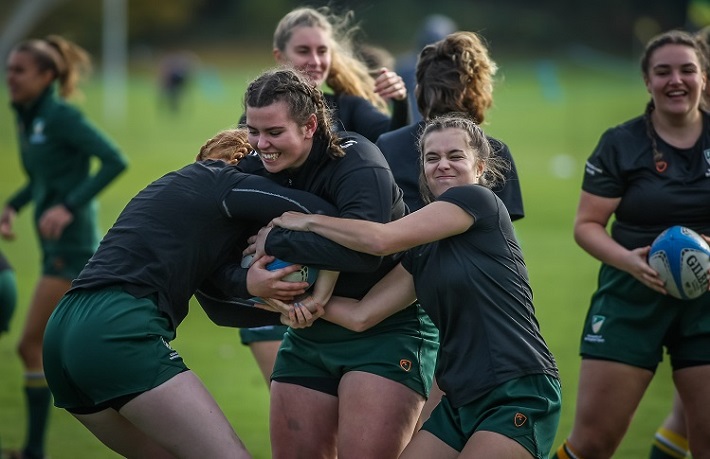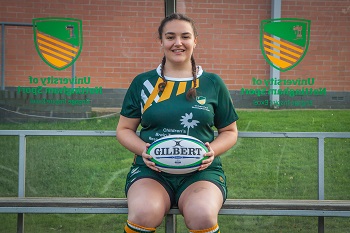
As well as marking the centenary of the Men’s Rugby Club this season marks 35 years of the Women’s Club too. Current President Jess Evans and club founder Sarah Stanley née Mallalieu (Geography, 1985) reflect on the past and present of rugby at the University and how it’s changed their lives.
-
Did you play rugby before coming to the University & what got you interested in the sport to begin with?
Jess Evans (JE): I had played a bit of rugby at school, but never competitively. I wanted to join the club at uni to meet new people and also to do something that would keep me active as well as being something different from my course.
Sarah Stanley (SS): No - girls didn’t play rugby in those days! I’d grown up with rugby - my dad played then refereed and my younger brothers played (one of them for England Schoolboys and Students.) I had also been to a couple of Internationals at Twickenham, but it was unheard of for girls/ women to play.
-
What were your memories of the women’s team here?
SS: To be honest, my memory is somewhat hazy after all these years! I managed to persuade a couple of friends to coach us and we had weekly evening training sessions but I don’t remember playing any competitive games as such. We did go to the first inter-University competition in 1985.
My parents had a camper van and we all piled in and they took us over to the competition at Keele University. We didn’t have enough to make a full team but we helped out other teams that were short. I remember Loughborough won easily and my dad (who was a little cynical) was amazed at their no 10 being able to kick conversions from near the touch line!
-
What did you gain/learn about yourself from being part of the rugby club?
SS: Unfortunately, as I didn’t set the team up until my final year, I wasn’t around to see it develop. So, I suppose a learning point is – get on and do things – don’t leave it too late! Also, it helped me to learn to go for things that may seem too difficult or even impossible.
There weren’t many of us in the beginning but, as they say, from small acorns, big oak trees grow and I’m delighted that women’s rugby at Nottingham (and beyond) has gone from strength to strength.
-
What does it mean to you to be part of the club?
JE: University of Nottingham Women’s Rugby Union club (UoNWRFC) has made my University experience amazing and has given me so many great memories at training, on game day and at socials, as well as lifelong friends. Even for the 7am training sessions or when it’s freezing cold I still want to turn up and train and play for this club which I love.
UoNWRFC has also introduced me to and made me fall in love with rugby, a sport I hope to continue to play after university.

Jess Evans outside the Vaughan Parry Williams Pavilion (above) and Sarah Stanley (right) featured in an article from BIAS about a special Ladies vs Men's Team match in 1984!
-
Any funny/memorable anecdotes?
SS: We played a promotional game against the men’s team, and tied their legs together so they couldn’t run - unsurprisingly we won! It was great fun and they we all definitely entered into the spirit, some being sin-binned for ‘excessive enjoyment’.
And not a memory or anecdote as such, but a couple of years after leaving I donated a ‘Founder’s Cup’ to be presented to a deserving player or club member. That cup appears to have gone AWOL, so I’d be delighted to find out where it is and offer an ‘amnesty’ for its return?!
-
Does it feel like the perception and support of female sport is improving today?
SS: Definitely. It’s now totally accepted that girls play rugby or football or indeed any sport. In my day, and we’re only talking one generation, there was very little outside of traditional girls’ sports at school. There’s a way to go, but things like the women’s Sevens now playing alongside the men in the World Series is a massive step.
JE: Yes, I do think it is, especially within rugby with the creation of more BUCS leagues for female rugby players to excel within the university structure. Women’s rugby has also been growing across the country from the RFU helping grassroots clubs to set up female sides, to the women’s international side winning a grand slam six nations in 2019 and being the first professional international women’s rugby side.
I can only hope these additions keep growing to ensure rugby is a sport open for all, as well as sport in general for women due to the beneficial nature it has both for mental health and general fitness.
-
Anything else you’d like to share?
SS: I continued my link to rugby beyond University, playing at Wimbledon a few years later in the early 1990s. In 1992 I also started refereeing and continued in every season for 22 years, even the year my twin boys were born! Even though I mainly refereed men’s leagues, I was for a while the highest graded female referee in the country and consequently was given the opportunity to referee six International Women’s games in Madrid (1998 Six Nations) and Women’s World Cups in Amsterdam (1998) and Barcelona (2002).
Just last May, I was presented with the new Women’s International blazer at Twickenham. Also, I’m delighted that my son Matthew is currently in his second year studying Chemistry at Nottingham. It was the amazing sports facilities that persuaded him to apply and it’s great that the University continues to promote all sport, which offers so much beyond just the physical benefits.